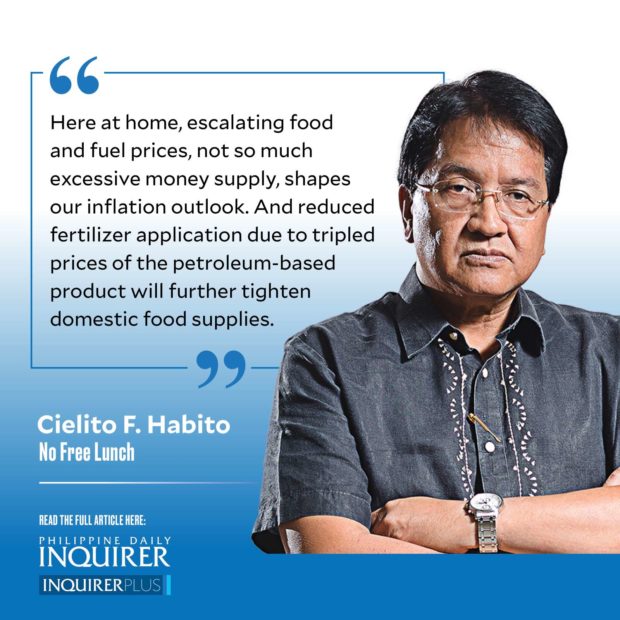Meeting inflation head-on
In my childhood days in the 1960s, we would watch on our dark Radiowealth TV screen “Da’ Best Show,” a daily early evening variety show that featured comedy skits with veterans Sylvia La Torre, Oscar Obligacion, Ading Fernando, and more. A recurrent skit scene was the family meal where members took turns sniffing on a small piece of meat hanging by a string, before taking a spoonful of rice—their supposed way of coping with not being able to afford “ulam” for everyone. It was funny to most of us then, but perhaps not for the poorest among us for whom even rice is too expensive to buy in sufficient quantity. And the bad news is, its price is set to go up further.
Worldwide, a rapid rise in food and fuel prices has been the unwanted fallout from the Russia-Ukraine war, on top of general inflation that had already resulted from massive COVID-19-related spending by countries—much of it financed with unprecedented printing of money even by erstwhile fiscally disciplined governments. The galloping inflation large economies are now reeling under forces them to rein it in with drastic moves to reduce money supply, with central banks raising interest rates and upsetting financial markets worldwide, including our own. Here at home, escalating food and fuel prices, not so much excessive money supply, shapes our inflation outlook. And reduced fertilizer application due to tripled prices of the petroleum-based product will further tighten domestic food supplies.
How bad could the price hikes get? What can we do to cope with heightened inflation still to come? One projection from a knowledgeable source has our annualized inflation rate steadily rising and breaching 8 percent by December, for a full-year average exceeding 6 percent. While plausible, it can also still be dampened if we are able to manage the forces pushing our prices up. As I wrote last week, our inflation is not quite the same as the prominently money-supply-induced inflation the big economies are now fighting, and are better dealt with by addressing supply-side problems. These include overcoming African swine fever that has drastically cut domestic pork supplies, improving fisheries output via aggressive aquaculture, reducing post-harvest losses and food wastage, improving rice milling recovery by turning more to healthier unpolished rice, ramping up production and application of nonchemical fertilizer substitutes, and more.
On the last, the University of the Philippines Los Baños is already working with the Department of Agriculture to quickly scale up production of its promising fertilizer substitute called Bio-N. This is a microbial-based fertilizer composed of good bacteria that can convert nitrogen from the atmosphere into a form plants can absorb. This is just one example showing that we have the scientific knowledge needed to cope with difficulties like what we now face, but had traditionally fallen short of making it widely accessible to our farmers. Crisis now pushes us to do it right. On unpolished rice, I’ve written before about how we could gain around 10 percent more rice volume by simply consuming more rice in unpolished or “brown” form (“Win-win with brown rice,” 7/17/12)—and actually become healthier in the process.
At the household level, there are various ways we could cope with rising food and fuel prices. Many of us turned to grow our own food, especially vegetables, in our backyards or even in hanging receptacles during the pandemic lockdowns; that continues to make much sense. We can plan our errands and trips more efficiently to reduce our transport costs. We can forego or cut down on nonessentials, especially the harmful “sin products” of tobacco and alcohol, and make a conscious effort to conserve energy and water in our homes—and there are many little ways of doing that, which could add up to much savings. And we could take extra effort to keep healthy and fit, through more exercise and avoiding infection risks, thus saving on avoidable medical costs.
Inflation expectations can be self-fulfilling, so the more we all do to cope with it, the less likely it will be as bad as we fear.
cielito.habito@gmail.com
For more news about the novel coronavirus click here.
What you need to know about Coronavirus.
For more information on COVID-19, call the DOH Hotline: (02) 86517800 local 1149/1150.
The Inquirer Foundation supports our healthcare frontliners and is still accepting cash donations to be deposited at Banco de Oro (BDO) current account #007960018860 or donate through PayMaya using this link.





















